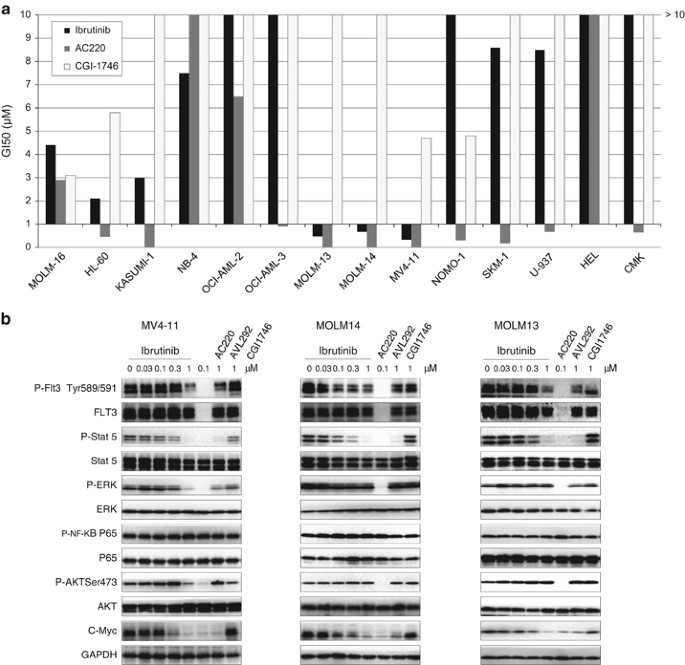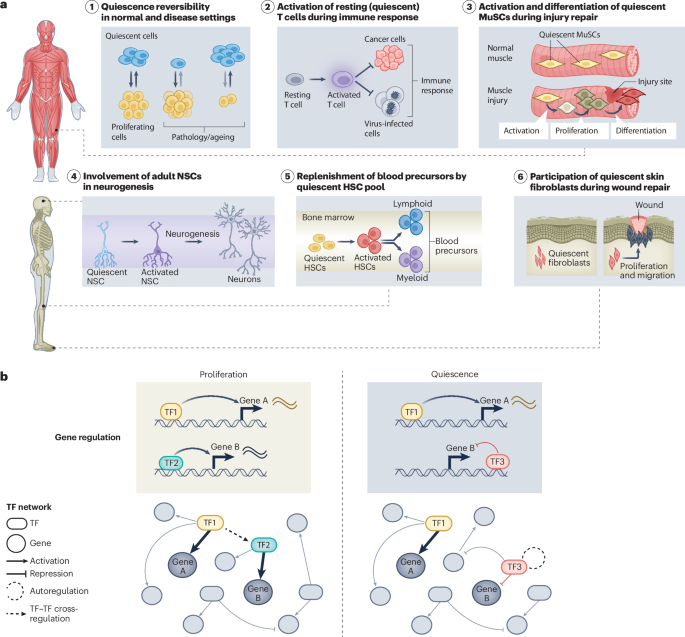
- Select a language for the TTS:
- UK English Female
- UK English Male
- US English Female
- US English Male
- Australian Female
- Australian Male
- Language selected: (auto detect) - EN
Play all audios:
Access through your institution Buy or subscribe Ibrutinib (PCI-32765) is an irreversible BTK (Bruton’s tyrosine kinase) kinase inhibitor that has been extensively used as a tool compound to
validate the role of BTK kinase in B cell related malignances.1, 2 Ibrutinib has been shown in preclinical studies to inhibit the proliferation of diffuse large B-cell lymphoma cells,
mantle cell lymphoma cells, chronic lymphocytic leukemia cells and multiple myeloma cells by blocking BTK kinase activity; ibrutinib was recently approved for the clinical application on
mantle cell lymphoma and chronic lymphocytic leukemia cells.3, 4, 5, 6, 7 Ibrutinib has also exhibited anti-inflammatory effects in preclinical models.8, 9 Recently, it has been reported
that ibrutinib is also effective against epidermal growth factor receptor mutant-positive non-small cell lung cancers through inhibition of epidermal growth factor receptor kinase
activities.10 In addition, there is evidence showing that BTK is also an important target for Acute Myeloid Leukemia (AML).11 As all of these cell lines express BTK kinase, we then studied
the effect of ibrutinib on BTK signaling. Upon anti-immunoglobulin M (IgM) stimulation of B-cell receptor to active the BTK kinase signaling pathway, we found that only in the FLT3 wild-type
(wt)-expressing cell lines (U937 and OCI-AML3), downstream mediators of BTK kinase were affected despite BTK phosphorylation having been inhibited in both FLT3 wt and FLT3-ITD cell lines.9
This suggests that FLT3-ITD mutant cell lines might not rely on BTK signaling for growth (Supplementary Figure 3A). Interestingly, except NOMO-1 and U937 cells, the phosphorylation of
BTKY223 of MOLM14, MOLM13, MV4-11, OCI-AML-3 and HL-60 cells did not respond to anti-IgM stimulation apparently, which might be due to the basal-level expression of the IgM in these AML
cells (Supplementary Figure 3B). AC220 did not affect BTK kinase activity and its direct downstream target PLCγ but instead inhibited phosphorylation of protein kinase B and
extracellular-signal-regulated kinase. The BTK inhibitors, CGI-1746 and AVL-292, were effective against BTK kinase and PLCγ kinase phosphorylation, but had no effect on the phosphorylation
of protein kinase B and extracellular-signal-regulated kinase. These results suggest that ibrutinib may mainly exert its inhibitory activity through FLT3 kinase but not BTK kinase in the
FLT3-ITD positive cells. To further confirm this, we knocked down BTK kinase in MOLM14 (FLT3-ITD), MOLM13 (FLT3-ITD), human erythroleukemia cell (HEL) (FLT3 wt) and NB4 (FLT3 wt) cells and
found that the growth of MOLM14 and MOLM13 was only minimally affected; however NB4 cells were significantly inhibited and HEL cells were moderately inhibited (Figures 2a and b). The fact
that BTK knockdown in HEL cells did not lead to suppressed growth may be due to the fact that mutant JAK2 is the oncogenic driver in this cell line.15 In addition, the finding that ibrutinib
still significantly blocked the growth of BTK-knockdown MOLM14 and MOLM13 cells further validated that the growth inhibitory effect of ibrutinib is likely dependent mainly on FLT3-ITD
inhibition. However, BTK kinase inhibition may also exert a combinatorial effect (Figure 2c). It has recently been reported that BTK kinase is activated by FLT3-ITD in FLT3-ITD positive cell
lines and dual inhibition of BTK and FLT3 kinase demonstrates combinatorial effects; these findings further confirm this observation.16 This is a preview of subscription content, access via
your institution ACCESS OPTIONS Access through your institution Subscribe to this journal Receive 12 print issues and online access $259.00 per year only $21.58 per issue Learn more Buy
this article * Purchase on SpringerLink * Instant access to full article PDF Buy now Prices may be subject to local taxes which are calculated during checkout ADDITIONAL ACCESS OPTIONS: *
Log in * Learn about institutional subscriptions * Read our FAQs * Contact customer support REFERENCES * Pan Z, Scheerens H, Li SJ, Schultz BE, Sprengeler PA, Burrill LC _et al_. Discovery
of selective irreversible inhibitors for Bruton's tyrosine kinase. _ChemMedChem_ 2007; 2: 58–61. Article CAS Google Scholar * Hendriks RW, Yuvaraj S, Kil LP . Targeting Bruton's
tyrosine kinase in B cell malignancies. _Nat Rev Cancer_ 2014; 14: 219–232. Article CAS Google Scholar * Woyach JA, Bojnik E, Ruppert AS, Stefanovski MR, Goettl VM, Smucker KA _et al_.
Bruton's tyrosine kinase (BTK) function is important to the development and expansion of chronic lymphocytic leukemia (CLL). _Blood_ 2014; 123: 1207–1213. Article CAS Google Scholar
* de Rooij MF, Kuil A, Geest CR, Eldering E, Chang BY, Buggy JJ _et al_. The clinically active BTK inhibitor PCI-32765 targets B-cell receptor- and chemokine-controlled adhesion and
migration in chronic lymphocytic leukemia. _Blood_ 2012; 119: 2590–2594. Article CAS Google Scholar * Tai YT, Chang BY, Kong SY, Fulciniti M, Yang G, Calle Y _et al_. Bruton tyrosine
kinase inhibition is a novel therapeutic strategy targeting tumor in the bone marrow microenvironment in multiple myeloma. _Blood_ 2012; 120: 1877–1964. Article CAS Google Scholar * Wang
ML, Rule S, Martin P, Goy A, Auer R, Kahl BS _et al_. Targeting BTK with ibrutinib in relapsed or refractory mantle-cell lymphoma. _N Engl J Med_ 2013; 369: 507–516. Article CAS Google
Scholar * Byrd JC, Furman RR, Coutre SE, Flinn IW, Burger JA, Blum KA _et al_. Targeting BTK with ibrutinib in relapsed chronic lymphocytic leukemia. _N Engl J Med_ 2013; 369: 32–42.
Article CAS Google Scholar * Chang BY, Huang MM, Francesco M, Chen J, Sokolove J, Magadala P _et al_. The Bruton tyrosine kinase inhibitor PCI-32765 ameliorates autoimmune arthritis by
inhibition of multiple effector cells. _Arthritis Res Ther_ 2011; 13: R115. Article CAS Google Scholar * Honigberg LA, Smith AM, Sirisawad M, Verner E, Loury D, Chang B _et al_. The
Bruton tyrosine kinase inhibitor PCI-32765 blocks B-cell activation and is efficacious in models of autoimmune disease and B-cell malignancy. _Proc Natl Acad Sci USA_ 2010; 107: 13075–13080.
Article CAS Google Scholar * Gao W, Wang M, Wang L, Lu H, Wu S, Dai B _et al_. Selective antitumor activity of ibrutinib in EGFR-mutant non-small cell lung cancer cells. _J Natl Cancer
Inst_ 2014; 106; doi: 10.1093/jnci/dju204. * Rushworth SA, Murray MY, Zaitseva L, Bowles KM, MacEwan DJ . Identification of Bruton's tyrosine kinase as a therapeutic target in acute
myeloid leukemia. _Blood_ 2014; 123: 1229–1238. Article CAS Google Scholar * Zarrinkar PP, Gunawardane RN, Cramer MD, Gardner MF, Brigham D, Belli B _et al_. AC220 is a uniquely potent
and selective inhibitor of FLT3 for the treatment of acute myeloid leukemia (AML). _Blood_ 2009; 114: 2984–3076. Article CAS Google Scholar * Di Paolo JA, Huang T, Balazs M, Barbosa J,
Barck KH, Bravo BJ _et al_. Specific Btk inhibition suppresses B cell- and myeloid cell-mediated arthritis. _Nat Chem Biol_ 2011; 7: 41–50. Article CAS Google Scholar * Evans EK, Tester
R, Aslanian S, Karp R, Sheets M, Labenski MT _et al_. Inhibition of Btk with CC-292 provides early pharmacodynamic assessment of activity in mice and humans. _J Pharmacol Exp Ther_ 2013;
346: 219–228. Article CAS Google Scholar * Quentmeier H, MacLeod RA, Zaborski M, Drexler HG . JAK2 V617F tyrosine kinase mutation in cell lines derived from myeloproliferative disorders.
_Leukemia_ 2006; 20: 471–477. Article CAS Google Scholar * Oellerich T, Mohr S, Corso J, Beck J, Dobele C, Braun H _et al_. FLT3-ITD and TLR9 use Bruton tyrosine kinase to activate
distinct transcriptional programs mediating AML cell survival and proliferation. _Blood_ 2015; 125: 1936–1947. Article CAS Google Scholar * Kayser S, Levis MJ . FLT3 tyrosine kinase
inhibitors in acute myeloid leukemia: clinical implications and limitations. _Leuk Lymphoma_ 2014; 55: 243–298. Article CAS Google Scholar * Advani RH, Buggy JJ, Sharman JP, Smith SM,
Boyd TE, Grant B _et al_. Bruton tyrosine kinase inhibitor Ibrutinib (PCI-32765) has significant activity in patients with relapsed/refractory B-Cell malignancies. _J Clin Oncol_ 2013; 31:
88–94. Article CAS Google Scholar Download references ACKNOWLEDGEMENTS JL, QL and WW are supported by the grant of ‘Cross-disciplinary Collaborative Teams Program for Science, Technology
and Innovation (2014-2016)’ from Chinese Academy of Sciences. ZZ is supported by Anhui Province Natural Science Foundation Annual Key Program (grant number: 1301023011). We thank China
‘Thousand Talents Program’ support for QL and ‘Hundred Talents Program’ of The Chinese Academy of Sciences support for JL and WW. AUTHOR INFORMATION Author notes * H Wu, C Hu, A Wang and E L
Weisberg: These authors contribute equally to this work. AUTHORS AND AFFILIATIONS * High Magnetic Field Laboratory, Chinese Academy of Sciences, Hefei, Anhui, China H Wu, C Hu, A Wang, W
Wang, C Chen, Z Zhao, K Yu, J Liu, J Wu, L Wang, B Wang, J Liu & Q Liu * University of Science and Technology of China, Hefei, Anhui, China H Wu, A Wang, J Wu & Q Liu * Department of
Medical Oncology, Dana-Farber Cancer Institute, Harvard Medical School, Boston, MA, USA E L Weisberg, A Nonami, R M Stone, S Liu & J D Griffin Authors * H Wu View author publications
You can also search for this author inPubMed Google Scholar * C Hu View author publications You can also search for this author inPubMed Google Scholar * A Wang View author publications You
can also search for this author inPubMed Google Scholar * E L Weisberg View author publications You can also search for this author inPubMed Google Scholar * W Wang View author publications
You can also search for this author inPubMed Google Scholar * C Chen View author publications You can also search for this author inPubMed Google Scholar * Z Zhao View author publications
You can also search for this author inPubMed Google Scholar * K Yu View author publications You can also search for this author inPubMed Google Scholar * J Liu View author publications You
can also search for this author inPubMed Google Scholar * J Wu View author publications You can also search for this author inPubMed Google Scholar * A Nonami View author publications You
can also search for this author inPubMed Google Scholar * L Wang View author publications You can also search for this author inPubMed Google Scholar * B Wang View author publications You
can also search for this author inPubMed Google Scholar * R M Stone View author publications You can also search for this author inPubMed Google Scholar * S Liu View author publications You
can also search for this author inPubMed Google Scholar * J D Griffin View author publications You can also search for this author inPubMed Google Scholar * J Liu View author publications
You can also search for this author inPubMed Google Scholar * Q Liu View author publications You can also search for this author inPubMed Google Scholar CORRESPONDING AUTHORS Correspondence
to J Liu or Q Liu. ETHICS DECLARATIONS COMPETING INTERESTS The authors declare no conflict of interest. ADDITIONAL INFORMATION Supplementary Information accompanies this paper on the
Leukemia website SUPPLEMENTARY INFORMATION SUPPLEMENTARY INFORMATION (PDF 2265 KB) RIGHTS AND PERMISSIONS Reprints and permissions ABOUT THIS ARTICLE CITE THIS ARTICLE Wu, H., Hu, C., Wang,
A. _et al._ Ibrutinib selectively targets FLT3-ITD in mutant FLT3-positive AML. _Leukemia_ 30, 754–757 (2016). https://doi.org/10.1038/leu.2015.175 Download citation * Published: 03 July
2015 * Issue Date: March 2016 * DOI: https://doi.org/10.1038/leu.2015.175 SHARE THIS ARTICLE Anyone you share the following link with will be able to read this content: Get shareable link
Sorry, a shareable link is not currently available for this article. Copy to clipboard Provided by the Springer Nature SharedIt content-sharing initiative









